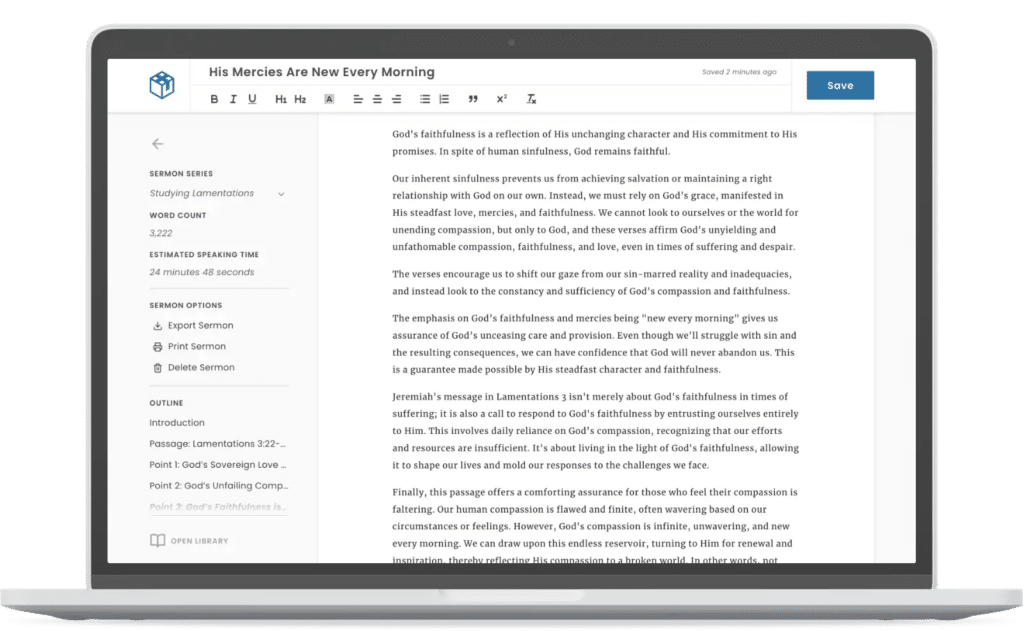
When ChatGPT was released, I used it to learn about a new hobby. After some initial research, I was ready to invest in the necessary supplies. I put in an order at a small hobby shop and was ready to get to work.
Unfortunately, I used AI to provide the list of starting materials I ordered. It wasn’t long after I placed that order when my phone rang. The shop owner called and said, “Hey, if you mix-and-match the components in your order, something will blow up.”
“Oh wow,” I said, “I had no idea.”
The shop owner replied, “I have to ask, where on earth was this combination of parts recommended?”
“ChatGPT.”
I quickly learned that I couldn’t blindly trust ChatGPT to make purchasing decisions. The same is true for sermon preparation.
In the past couple years, artificial intelligence (AI) has become a game-changer, simplifying many of our everyday tasks. This has led to countless companies scrambling to include AI in their products, and subsequently introduced the temptation for pastors to use AI for sermon writing.
But pastors have a theological responsibility to prevent ChatGPT from driving the pulpit. We’ll expand on that in a moment.
The appeal of an “AI Sermon Writer” is clear—saving time on sermon prep could allow pastors to focus more on building relationships within their congregations and spend more time with their families.
AI systems, like Large Language Models (LLMs), work by stringing together words based on language patterns. Think of how the “predictive text” works on your iOS or Android device keyboard. If you open up a text message, start with one word, hit the next suggested word, so on and so forth, you might make a logical text—or you might just confuse whoever you’re texting.

AI chatbots work in a similar way, but they’ve been iterated to generate coherent responses. It may spit out thought-provoking thoughts and ideas, but AI obviously doesn’t possess the ability to grasp the infinite grace provided by God through the redemptive work of Jesus on the cross.
It lacks the ability to articulate genuine emotions and experiences that pastors extract from God’s Word. Ultimately, we tread into dangerous territory when we trust a computer to attempt Biblical exegesis on our behalf.
AI Sermon Writers Hinder Spiritual Growth
The authority and sufficiency of God’s Word places a critical responsibility on pastors to handle God’s Word with utmost care. As emphasized in verses like 2 Timothy 2:15, James 3:1, and Titus 1:9, pastors must perform accurate and truthful exegesis. This deep study, coupled with prayer and reliance on the Holy Spirit during the sermon prep process, ensures a pastor’s teaching is rooted in truth.
While AI sermon writing tools are tempting, they cannot capture the depth of the relational richness that the Bible has in a pastor’s life as they study, experience conviction, and apply God’s Word to their daily walk. Not only does AI fall short here, but it’s a contradiction to 2 Timothy 2:15 which mandates pastors to “rightly handle the word of truth.”
This careful handling of God’s Word edifies the church and glorifies God, ensuring that pastoral teaching aligns with Scripture’s inherent relevance and power, addressing the specific challenges faced by their flock.
So what about SermonKit? We call SermonKit the “Automatic Sermon Writing App.” The SermonKit cloud-based sermon app works to make your message writing as smooth, easy, and efficient as possible. We do this with an easy-to-use sermon builder and relevant sermon illustrations.
SermonKit’s illustrations are written by pastors—not AI—with sound theology using relational, relevant thoughts, stories, and Biblical concepts. Our sermon illustration topics provide a relational human element to help congregations connect with the Gospel message.

Will SermonKit utilize AI in the future? Possibly, but never as a crutch to do exegesis for you. Preaching is a high calling, and as teachers of God’s Word, we are not to take that calling lightly (James 3:1). We’re exploring helpful features to improve your sermon writing workflow, and if that feature involves AI, we feel it’s worth considering.
We’re excited about the potential of AI and it’s responsible possibilities within sermon writing software. But as expositors of God’s Word, we’re held accountable if we “preach” something incorrect that has been generated by AI. Our primary focus is to making pastors’ lives easier by providing tools to simplify the sermon writing process and providing theologically sound illustrations and resources. At this point, we’re not ready to half-heartedly cram AI into that equation.
Learn how SermonKit sermon prep software can make your message writing easier and help you write your sermons up to 44% faster, every week!

